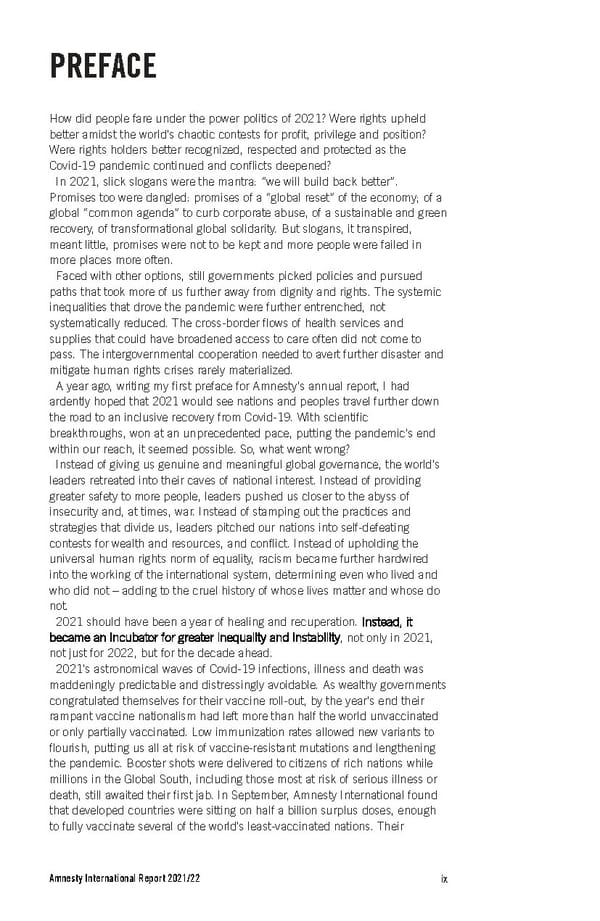PREFACE How did people fare under the power politics of 2021? Were rights upheld better amidst the world’s chaotic contests for profit, privilege and position? Were rights holders better recognized, respected and protected as the Covid-19 pandemic continued and conflicts deepened? In 2021, slick slogans were the mantra: “we will build back better”. Promises too were dangled: promises of a “global reset” of the economy; of a global “common agenda” to curb corporate abuse, of a sustainable and green recovery, of transformational global solidarity. But slogans, it transpired, meant little, promises were not to be kept and more people were failed in more places more often. Faced with other options, still governments picked policies and pursued paths that took more of us further away from dignity and rights. The systemic inequalities that drove the pandemic were further entrenched, not systematically reduced. The cross-border flows of health services and supplies that could have broadened access to care often did not come to pass. The intergovernmental cooperation needed to avert further disaster and mitigate human rights crises rarely materialized. A year ago, writing my first preface for Amnesty’s annual report, I had ardently hoped that 2021 would see nations and peoples travel further down the road to an inclusive recovery from Covid-19. With scientific breakthroughs, won at an unprecedented pace, putting the pandemic’s end within our reach, it seemed possible. So, what went wrong? Instead of giving us genuine and meaningful global governance, the world’s leaders retreated into their caves of national interest. Instead of providing greater safety to more people, leaders pushed us closer to the abyss of insecurity and, at times, war. Instead of stamping out the practices and strategies that divide us, leaders pitched our nations into self-defeating contests for wealth and resources, and conflict. Instead of upholding the universal human rights norm of equality, racism became further hardwired into the working of the international system, determining even who lived and who did not – adding to the cruel history of whose lives matter and whose do not. 2021 should have been a year of healing and recuperation. Instead, it became an incubator for greater inequality and instability, not only in 2021, not just for 2022, but for the decade ahead. 2021’s astronomical waves of Covid-19 infections, illness and death was maddeningly predictable and distressingly avoidable. As wealthy governments congratulated themselves for their vaccine roll-out, by the year’s end their rampant vaccine nationalism had left more than half the world unvaccinated or only partially vaccinated. Low immunization rates allowed new variants to flourish, putting us all at risk of vaccine-resistant mutations and lengthening the pandemic. Booster shots were delivered to citizens of rich nations while millions in the Global South, including those most at risk of serious illness or death, still awaited their first jab. In September, Amnesty International found that developed countries were sitting on half a billion surplus doses, enough to fully vaccinate several of the world’s least-vaccinated nations. Their Amnesty International Report 2021/22 ix
 Amnesty International Report 2021/22 Page 8 Page 10
Amnesty International Report 2021/22 Page 8 Page 10